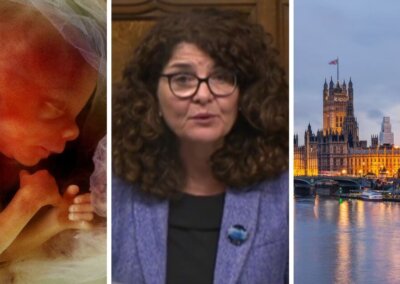A new poll organised by the University of Liverpool and Britain’s Economic and Social Research Council has shown that 58% of Sinn Fein voters and 54% of DUP voters want their country’s new abortion framework to only allow abortions when the mother’s life is at risk. This is a clear rejection of the extreme proposed abortion framework that the UK Government wants to impose on the people of Northern Ireland.
The polling demonstrates that the Conservative Government has no mandate from the people of Northern Ireland to go further than legally required when introducing Northern Ireland’s abortion framework.
The poll of 2,000 people showed that:
- 58% of Sinn Fein voters supported abortion being available only where the mother’s life is in danger.
- 54% of DUP voters supported abortion being available only where the mother’s life is in danger.
- Only 5% of all voters support introducing abortion through to 24-weeks – which is in-line with what the Conservative Government has proposed introducing to Northern Ireland.
The current Conservative Government are legally required, by the Northern Ireland (Executive Formation etc) Act 2019, to introduce a limited abortion framework in the province.
The Government has launched a consultation on a proposed abortion framework for Northern Ireland which goes far beyond the limited changes strictly necessary for the Government to comply with the Northern Ireland (Executive Formation etc) Act 2019.
The proposed framework drops many of the current legal safeguards provided by the Abortion Act in England and Wales. The proposals open up abortion provision to any healthcare professional, which could include pharmacists, nurses, midwives, healthcare assistants, art therapists and dieticians. It also drops the requirement that two doctors sign off on an abortion.
The proposal includes virtually no legal limit on the locations on where abortions can take place, potentially allowing for the home use of both abortion pills along with abortion provision in pharmacies, GPs surgeries, school nurse clinics, mobile abortion clinics and ‘telemed’ abortions.
In practice, abortion on demand would be available to either 22 or 24 weeks under mental health grounds. Abortion without certification would be available to either 12 or 14 weeks. This would allow sex-selective abortions to be available on-demand through this period with no specific provision banning sex-selective abortion through 22/24 weeks.
The proposal would also see abortion for disabilities, including cleft lip, club foot and Down’s syndrome introduced to Northern Ireland, and possibly available right through to birth.
In England and Wales – where abortion is available up until birth if a baby has a disability – people with disabilities are unjustly and disproportionately targeted by abortion legislation.The latest available figures show that 90% of children diagnosed with Down’s syndrome before birth are aborted in England and Wales.
Northern Ireland has a very different approach. Disability-selective abortion for Down’s syndrome is not permitted and there is a culture of welcoming and supporting people with this disability rather than screening them out.
This is reflected directly in the latest figures (2016) from the Department of Health in Northern Ireland, which show that while there were 52 children born with Down’s syndrome, in the same year, only 1 child from Northern Ireland with Down’s syndrome was aborted in England and Wales.
This very large discriminatory change was highlighted in a speech by disabled peer Lord Shinkwin in the House of Lords when he was speaking against the proposed changes.
A spokesperson for Right To Life UK, Catherine Robinson said:
“This polling shows a clear rejection from the people of Northern Ireland for the UK Government’s plans to impose an extreme abortion framework on Northern Ireland.
“Only last month, Sinn Fein and the DUP put aside their differences which allowed the Northern Irish Executive to be restored. This was celebrated across all communities in Northern Ireland, and by the UK Government, as an opportunity for the people of Northern Ireland to get their voice back.
“One issue which unites the majority of both Sinn Fein and DUP voters is the rejection of the UK Government’s proposed extreme abortion framework. If the devolution settlement of Stormont is to be respected, the cross-community view against this extreme abortion framework must be respected.
“If the UK Government pushes ahead with their extreme abortion framework proposals, they would be undermining the devolution settlement at a time when it is already fragile.
With Stormont restored, it is vital that the people of Northern Ireland have a say on their country’s new abortion framework through their elected representatives in the Northern Irish Assembly.
The law sadly requires the UK Government to introduce a new abortion framework in very limited circumstances. Going further than what they are legally bound to do demonstrates a will from the UK Government to impose their abortion-on-demand ideology on Northern Ireland, which would be surprising considering the Conservative Party claims abortion is a matter of conscience.
To stand up for the devolution settlement; to show that they are listening to the voters of Northern Ireland; to be consistent with their party’s own position; and ultimately to protect the unborn child, I urge the Conservative Government to drop their proposed extreme abortion framework for Northern Ireland, and only implement what that they are legally bound to do.”












